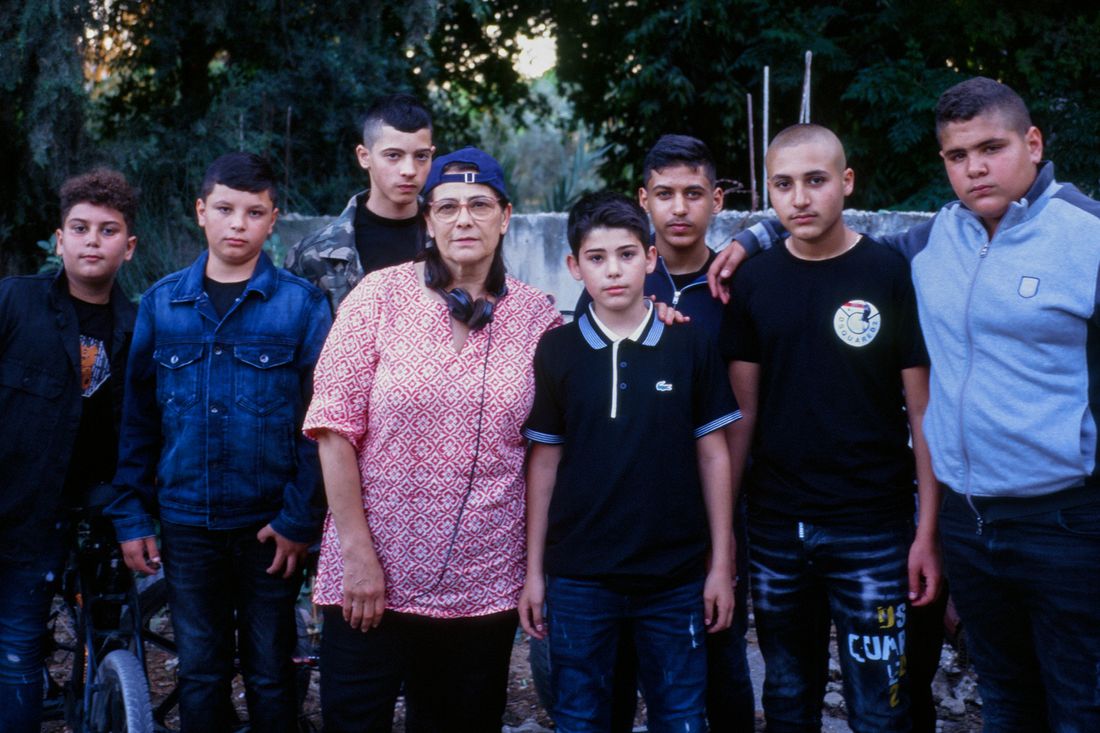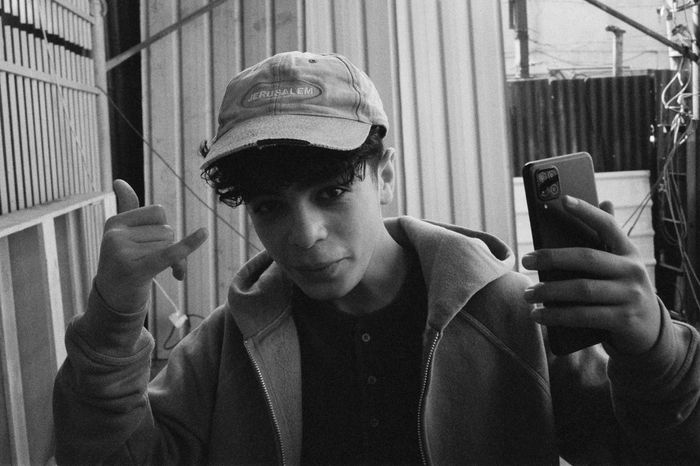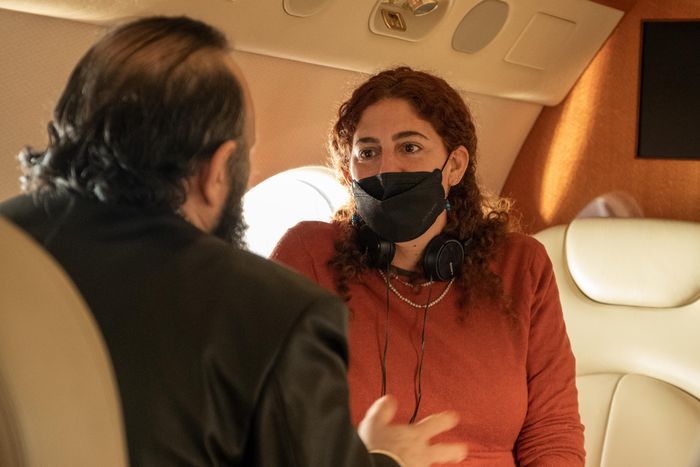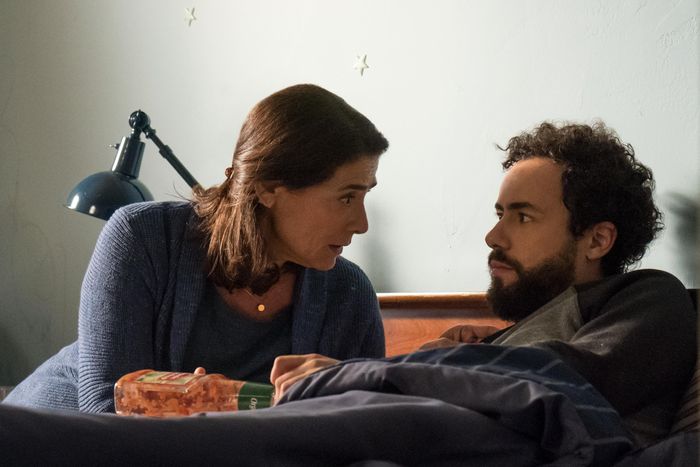
When the Ramy episode “Egyptian Cigarettes” debuted on Hulu on September 30, 2022, it was unlike anything on American television. Filmed in Israel with a predominantly Palestinian crew and Palestinian guest actors, the third-season installment follows Ramy Youssef’s titular character as he attempts to navigate the checkpoints leading in and out of the Palestinian territories. In typical self-centered Ramy fashion, he is so obsessed with his own pursuits — getting to a business meeting on time after a failed Tinder date with a Palestinian woman in East Jerusalem — that he can’t possibly predict the international incident that unravels when, in a dark comedy of errors, he aids in the arrest of a Palestinian child by the Israel Defense Forces. The frank depiction of the IDF as an occupying force with unparalleled power, coupled with the episode’s production in Israel, marked a radical approach to the way American television depicts the decadeslong international conflict — which has, since the Israel-Hamas war began on October 7, divided opinions around the world.
“Thinking about the episode a year and a half later, I’m like, Man, I don’t even know how we would make that today, on many levels, the main level being quite practically,” Youssef says, speaking with Palestinian actress Hiam Abbass, who plays Ramy’s mother, Maysa, in the series and served as a consulting producer on this episode. (Abbass, whose family was displaced by the 1948 Nakba, was raised in the Palestinian village Deir Hanna in Israel.) The two reunited weeks after the start of the current war, which has resulted in the deaths of 1,200 Israelis and more than 18,000 Palestinians, to discuss what made “Egyptian Cigarettes” so powerful at the time and how their former cast and crew are navigating a very different Israel and Palestine today.
How are you doing? How have you been doing since October 7?
Ramy Youssef: It’s really sad. And for a lot of us, it’s another chapter in this timeline of really sad things. We were in Palestine when Shireen Abu Akleh was murdered. We went to her funeral. So when I say this is part of a timeline that we dread — the whole timeline — it’s because every time something happens and innocent people are killed, it does something to the soul, does something to the heart. It’s why we made “Egyptian Cigarettes.” It’s why we focused it on kids. I feel for all the people we worked with who are there. We have crew whose families are directly in Gaza.
Hiam Abbass: I’m speechless in the sense of what I could express apart from sadness, disappointment, feeling that the years of my life went for, really, nothing. Every time I accepted work on a part, I thought the human side and the story told through that part would maybe advance things. I’m in mourning. Trauma from my childhood comes back to me. The exile and being here doesn’t help the situation. My daughter Lina Soualem’s documentary Bye Bye Tiberias talks a little bit about the story of women in my family.
RY: Bye Bye Tiberias is this really beautiful portrait of all of the women in Hiam’s family. Being able to see the history through a really personal lens and to see the archival footage Lina dug up of not just Palestine historically but women in Palestine — it’s a place that sometimes gets brushed away as if it didn’t exist. Seeing that existence was really powerful.
HA: I’m holding on to hearing Ramy, hearing my friends, hearing my beloved ones, calling my friends that lost family, reading press from Israelis who want to end this bloodshed and try to see what we can do together, talking to some Jewish friends of mine — everything helps us continue just a little bit further. It’s a dark moment. It’s a tunnel. I really want to see light.
What have your conversations with Wadia Jazmawi and Abed Al Nasser Al Sadi, the young actors from “Egyptian Cigarettes,” been like?
RY: Jenin has always been a tough place to live. A lot of those spaces already have illegal settlements all around them. And the IDF is destroying anything that makes those places feel like home. They told me about this statue they built in the middle of the city that was an artistic piece of resistance. It had pieces of old ambulances that had been destroyed by the IDF. They took them and made them into an art piece and then that art piece got demolished. A statue of Yasser Arafat, who literally stands for the opposite of the Hamas ideology, was taken down and destroyed. We’re feeling this whole destruction of spirit. I feel that just as an American.
So many of the people in the West Bank have never even left. When Wadia came to shoot the episode, that was the first time he’d been at the beach. His first time going to the beach was with our production assistant Nora Mohamed, a Muslim woman, and our line producer Tyson Bidner, a Jewish man from New York. That’s what our work has always been about — that’s what our crew and our artistic family have always been about, and that’s still very much true. It’s one of the small lights we try to find. But it feels like everything around that is crumbling right now.
HA: Talking in this period about the past is almost as if it wasn’t relevant anymore — the way we cooperated together as artists in a human way. Today, the barrier is very big, and to break it, we need a lot of tears, a lot of strength, a lot of convictions, a lot of trust. And we need to rebuild again, really, from zero because there’s no trust left between the two. The war has to stop. The bloodshed has to stop. Silence is a killer, and it kills hearts and it kills thoughts and it kills abilities and it kills imagination.
RY: As artists, we’re all questioning, Man, how effective is the awareness that our work brings up? Because look, I’ve had plenty of people say, “I didn’t know anything about what was going on in Palestine until I saw Ramy season three or until I watched Mo on Netflix.” I think people will feel that too when they see Bye Bye Tiberias. On a level, that feels like a contribution. But on the other hand, it’s like, how much art and how many jokes and how many creative things have we explored in this country, in America, around gun violence, and we still cannot make even the smallest dent in the gun lobby? We can’t even get on the same page of making a gun harder to get. We’re not even talking about getting rid of guns.
It has been really difficult, even in artistic communities that are supposed to be focused on the heart, to see people adopting totalitarian, warmongering points of view. I’m like, Wait, I thought we were all artistic partners that focused on people and humanity. How is asking for a cease-fire controversial? People need to realize that this moment is bigger than this moment. It is not only massive for the innocent human beings — men, women, and children — who have died while we’re in this interview. There’s also a much larger wave here of corporate interest versus the people’s interest. All of the seeds we’ve planted between artists, between human beings, the diversity of thought and faith and communication — that is beautiful and cherished, and I feel we will be able to get all of that back. What’s in the way is the reality that we’re in systems that are purely driven by money. It’s part of the theme of the episode, and it’s why I’m bringing it up here. The Guardian wrote about one of these calls with these financial guys talking about the profit margins on what’s happening in Gaza. That tells you how all of us are viewed. Everyone feels incredibly powerless because there’s only a few people who have access to the keys and who control how things go forward.
The crew for the episode was predominantly Palestinian, including director Annemarie Jacir. Have you been able to contact them?
HA: It’s very tough for Annemarie because she was preparing to shoot a feature that she had to postpone until January. I’ve been in touch with a lot of people because all my family is there, basically. Not only my friends, not only people I work with — it’s my past, my memories, everything is over there. It’s very hard to disconnect.
RY: Between our crew and everyone involved in the episode, there are probably seven to ten people I’ve been checking in with. In my own community where I grew up in New Jersey, there are a lot of Palestinians. One person I know has basically lost generations of their family at this point, over 50 members gone. Just gone.
One of the main points of “Egyptian Cigarettes” is that religion and nationalism are not the same thing. Do you feel that message from the episode is being reinforced right now through the protests for a cease-fire bringing together groups of various backgrounds?
RY: Religion is a very sacred thing. That’s why it’s called “sacred,” you know? Seeing religion being used to perpetrate anything violent is the worst of humanity. I don’t think there should be nation-states. Obviously, that could be brushed off as college-dorm-room thinking, but my ideal world is, we don’t need borders. We are living in a society that puts humanity over capitalist interests. Drawing borders and lines and then assigning them — we’re the good guys or we’re the religious guys or whatever — none of these things are ever real. They’ve never aged well. There’s no country that doesn’t have a laundry list of massacres. The thing that is so beautiful about religious community gets really distorted when you try to scale it to a nation. That’s also very clear, even if I look only at the Arab Muslim world. We haven’t figured it out. We have not figured it out when it’s tied to nationalism.
HA: In my family, this is how religion was taught to me: It’s my own connection with the spirituality that I choose in this world. I never could believe that in the name of that spirituality, I would allow myself to kill, I would allow myself to do any bad thing. And if I go to nationalism in the sense of struggle and borders, this is one of the things I fought against. Because of the situation in which I was born, it’s basically that I wanted to cross the borders — the physical borders — that nationalism had obliged me to respect. And I did not want to respect that. For me, breaking these borders meant arriving to a bigger scale of life and a more free space where I could live with people in peace. Nationalism was not the answer to anything I believed in when I was younger, or that I still believe in.
I really just want this to end. Whatever it is — even if the after is not like the before anymore, and the after would be a new thing we have to discover altogether — let’s get there. Let’s try and do something that would be more positive to all of us, specifically to those who really believe peace should happen in that part of the world. We need to be creative again. We need to be able to give our energies to better things — to life and not to death. To life.
When you look back on the episode, what are you most proud of? What do people who recently watched it tell you they connected with?
RY: I’ve got a lot of messages from people saying, “Watching it got me to go read more, watching it made me realize something I didn’t know.”
What I’m most proud of is the kids who are in it. They’re part of this theater troupe called Freedom Theatre; one of their friends who was in that group has died. These two kids from Freedom Theatre Group in Jenin got to be on TV in America, and since then they’ve been like, Yo, we could — we are actors. Not only could we be actors. We did it, and we can do it. And they’re really good. These guys are amazing on-camera — their emotional intelligence, the way they take notes.
HA: I was very proud of everything I was given to do in that episode. It made me so proud to be part of this and to see that Ramy, the show I’m on in the States, made its way to where I was born and I grew up. It was really incredible to see this group of people become tight artistically in order to make it. Did you ask anybody then, “Are you Jewish or Muslim or Christian, or Palestinian or Israeli or American?” You didn’t care. What we did was above all nationalities and above all religions, and we were all united in order to do this.
RY: I remember leaving and saying, “I actually don’t mind what happens with this episode — if it’s controversial, if it doesn’t work.” The experience we had making it, getting to intimately know everyone there in the way you only can when you get really close and work on something, is the thing I’m most proud of. Hiam was the best assistant director ever. Between English and Arabic and Hebrew, you could really see the way she navigated everything, whether with Palestinians or with Israelis. I’ve always had this immense respect for Hiam, but obviously seeing her there, too, I saw a part of her personality that I never could have seen in New York, that I never could have seen in Paris. It’s seeing it there.
I’m wondering if you think this episode could get made after everything that’s happening now, or if it’s impossible to imagine the future of what art could be like after this ends.
RY: I’m really grateful that the narrative took us there organically. We were able to weave a lot of what we did within the context of our show. Because I’m not Palestinian, right? Part of the gift of even being able to go there was the reality that we embraced, that Hiam is Palestinian and it made this fictional Ramy character half Palestinian and half Egyptian. What is happening to people in Palestine, and has been happening, has been very close to my heart and very much like what’s happened to the Uyghurs in China and to Syrians in their own country. The list of people we think about and pray for is too long. Having this connection with Hiam made it organically very possible to get there in the show, in the same way that having such a deep friendship with Mo made it possible to do that on our other show.
Conversations feel really difficult now because something incredibly fresh and painful is happening. Art heals, and it is incredibly hard to heal something that is still being wounded. What’s been happening in Palestine has been actively wounding for a very long time. There’s almost been a tolerance there so you could sneak some art in. But in general, it’s been an incredibly hard thing to broach because the pain is so active.
If I look at the situation right now, I’m going to say that I still believe in the free speech America says we’re supposed to have, even though I have seen people lose their jobs and I have seen people be censored. We’ve seen Rashida Tlaib censured for saying things that human-rights organizations agree with; we’ve seen a lot of things that make us fear for our ability to speak freely. But I’m going to be optimistic and say it’s not going to stay that way. Maybe I’m delusional, but I’m going to say the open heart for sincere communication that Hollywood prides itself on will continue. That’s my hope. That’s my belief.
HA: Right now, it’s emotional and it’s an open wound we need to heal. Once the wound is healed, we’re the same people. We’ll be a little bit wounded, but we will be wounded together. We won’t be wounded one against another. We’re hand in hand, always, and we will stay that way. If I say something today because I’m not feeling very good or I’m wounded, it doesn’t mean it’s against humanity and against human beings. It’s against bigger systems that are above my head that I cannot reach out for. But I need human beings, and I need colleagues, and I need the business, and I need everybody to gather together in order to advance together, in order to keep creating and keep willing to create in a good, human, mannered way. And I think we’re all capable of that. We are capable of that.
This interview has been edited and condensed for clarity.





